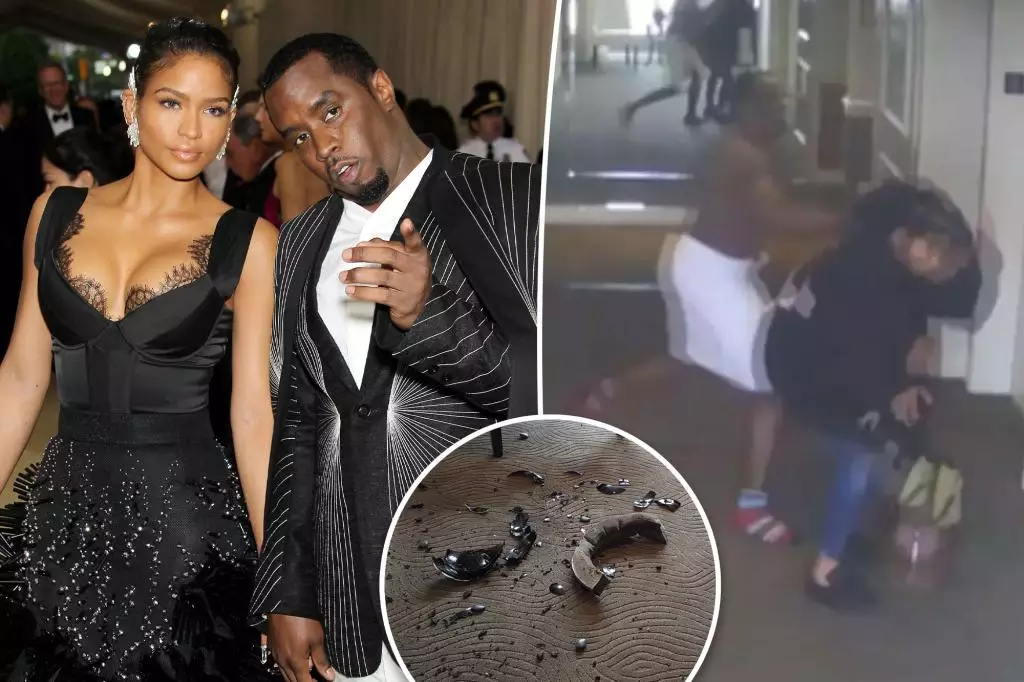In a courtroom echoing with tension, the ongoing trial against Sean “Diddy” Combs has thrust into stark relief the harrowing reality of domestic abuse and the complexities surrounding high-profile figures. This trial doesn’t merely revolve around legal proceedings; it embodies the painful stories of victims who have historically been silenced or ignored. As the narrative unfolds, it becomes evident that this case serves as both a cautionary tale and a pivotal moment in bringing systemic issues of abuse to light.
On March 2016, amidst the plush interiors of the now-defunct InterContinental Hotel in Century City, California, an incident occurred that would reverberate long after. Prosecutors presented jurors with harrowing evidence, including unsettling photographs documenting the aftermath of a disturbing attack on Cassie Ventura, Combs’ then-girlfriend. In chilling detail, the images revealed broken glass from a vase tossed violently by Combs, along with disturbing injuries that Ventura suffered. Each picture serves not just as evidence but as a grim reminder of the personal trauma that often remains hidden from the public eye.
The Harrowing Testimony of Cassie Ventura
As Ventura took the witness stand for the second consecutive day, her emotional recounting conveyed the depth of her trauma. She reflected on the experience of fear and physical pain, specifying how a broken vase became a violent symbol of the turmoil she endured during her decade-long relationship with Combs. The courtroom atmosphere turned heavy as she described, “I just remember it coming towards me,” illustrating the moment not as a mere event but as an indelible memory of fear.
Her cellphone images showcased a swollen lip, visible proof of the violence she suffered. However, her reluctance to speak up initially adds layers to the complexity of domestic abuse. Although a friend attempted to involve law enforcement immediately after the incident, Ventura chose silence—a silence that many victims of abuse can relate to. This silence speaks volumes about emotional and psychological manipulation, the coercive tactics that abusers utilize to maintain control over their victims.
The Impact of Surveillance Footage
Unveiling a previously unseen extended version of surveillance footage has thrust the trial into further chaos. The grainy video depicts Combs in a frenzy, pursuing Ventura down a hotel hallway, his actions both aggressive and predatory. The visual evidence of Combs chasing Ventura and the brutal moment when he threw a vase towards her amplifies the chilling reality that victims often face. It raises critical questions about accountability, particularly for those in powerful positions.
The role of the hotel security guard, Israel Florez, also highlights the intricacies surrounding such incidents. During his testimony, he indicated that Combs offered him money to remain silent about what he witnessed, shedding light on the disturbing fusion of wealth and power that can distort justice. The fear instilled in those close to the matter exemplifies how abusers can wield their influence to silence witnesses and maintain control.
The Broader Implications of Combs’ Allegations
The gravity of the allegations against Sean Combs extends far beyond personal grievances; they touch on societal frameworks that often enable abuse to go unchecked. The trial has surfaced issues of emotional trauma, financial domination, and a culture of fear that is pervasive in relationships characterized by abuse. Ventura’s lawsuit accusing Combs of rape and the ensuing media coverage only underscore the importance of listening to victims and believing their stories.
Combs faces multiple charges, including sex trafficking and racketeering conspiracy, which, if proven, could result in severe consequences that include life imprisonment. But beyond the potential legal repercussions, this trial is a societal litmus test regarding how we address abuse, especially when it involves high-profile individuals. The distinct lack of urgency in responding to victims can perpetuate cycles of violence, and it is essential that this case prompts deep introspection and change within our communities.
As the trial against Sean “Diddy” Combs progresses, it serves as a pivotal moment in the broader discourse around domestic abuse and accountability, challenging both individuals and society to confront uncomfortable truths.

